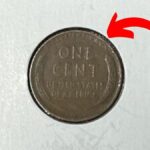The Lincoln Wheat Penny Valued at $2.8 Million: In the world of rare coins, an extraordinary treasure hunt is underway. A Lincoln Wheat Penny, valued at an astounding $2.8 million, could still be circulating among the billions of pennies in existence today. This seemingly ordinary coin, minted during a crucial period in American history, represents one of the most valuable numismatic discoveries possible. The prospect of finding such a valuable coin in everyday pocket change has captured the imagination of both seasoned collectors and casual observers alike.
The story begins in 1909 when the U.S. Mint introduced the Lincoln Wheat Penny to commemorate the 100th anniversary of Abraham Lincoln’s birth. Produced until 1958, these pennies featured Lincoln’s noble profile on the front and two distinctive wheat stalks on the reverse. While millions of these pennies were struck during their production run, certain rare varieties have become incredibly valuable due to unique circumstances surrounding their creation.
The World War II Connection
The most valuable of all Lincoln Wheat Pennies is the 1943 Bronze Penny. During World War II, the United States government ordered the Mint to produce pennies from zinc-coated steel instead of copper, as copper was critically needed for the war effort. However, in a fascinating twist of fate, a few bronze planchets (coin blanks) from 1942 accidentally made their way into the 1943 production line, creating what would become one of the most valuable coins in American history.
What Makes It Worth Millions?
The extraordinary value of the 1943 Bronze Penny stems from several crucial factors. First is its extreme rarity – only a handful of these bronze pennies are known to exist. Second is the historical significance of its accidental creation during wartime production changes. Finally, the coin represents a perfect storm of numismatic interest, combining a popular coin series with a fascinating wartime story and genuine rarity. These factors culminated in a spectacular auction sale where a pristine specimen achieved $2.8 million.
Identifying a Potential Fortune
For those hoping to discover this valuable treasure, several key identification steps are crucial. First, check the date – 1943 is the most valuable year, though other years like 1909, 1914, 1922, 1931, and 1955 can also be quite valuable. Next, examine the mint mark below the date, which indicates where the coin was produced. Denver (D) and San Francisco (S) marks can add value, while Philadelphia-minted coins have no mark.
The Magnetic Test
One of the most reliable ways to identify a potentially valuable 1943 penny is the magnetic test. Regular 1943 pennies were made of steel and are magnetic, but the rare bronze versions will not stick to a magnet. This simple test can provide an initial indication of whether further professional evaluation is warranted.
Condition Matters
The condition of a rare penny plays a crucial role in determining its value. Coins that have retained their original mint luster, show minimal wear, and maintain sharp design details command the highest prices. However, even well-worn examples of rare varieties can be worth substantial sums. Professional grading becomes essential for establishing the true value of any potentially rare specimen.
The Authentication Process
If you believe you’ve found a valuable penny, proper authentication is crucial. The market for rare coins has unfortunately attracted counterfeiters, making professional verification essential. Reputable coin dealers and third-party grading services can authenticate your find and provide an accurate assessment of its value and condition.
Where to Sell a Valuable Discovery
Should you be fortunate enough to discover a valuable Lincoln Wheat Penny, several options exist for selling it. Professional coin dealers can offer immediate purchase or consignment services. Major auction houses specializing in numismatics provide access to serious collectors willing to pay premium prices. Online marketplaces like Heritage Auctions and PCGS also offer platforms for reaching potential buyers.
Preservation and Protection
Proper handling and storage are crucial for maintaining a coin’s value. Never clean or polish old coins, as this can severely diminish their worth. Handle coins only by their edges to prevent oils and contaminants from damaging the surface. Store valuable specimens in appropriate holders that protect against environmental factors and physical damage.
The Educational Value
Beyond the potential financial windfall, searching for rare Lincoln Wheat Pennies offers educational opportunities. It teaches aspects of American history, economics, and manufacturing processes. The story of the 1943 Bronze Penny particularly illustrates how historical events like World War II affected even the smallest aspects of daily life.
The Hunt Continues
While finding a $2.8 million penny remains a remote possibility, the search itself adds excitement to numismatics. Collectors regularly examine rolls of pennies and old collections, hoping to make the discovery of a lifetime. This ongoing treasure hunt maintains interest in coin collecting and preserves an important aspect of American numismatic history.
The story of the $2.8 million Lincoln Wheat Penny reminds us that extraordinary value can be found in the most ordinary places. While discovering such a valuable coin is extremely rare, the possibility exists that one could still be circulating, waiting to be discovered. Whether you’re an experienced numismatist or simply curious about old coins, checking your pocket change might lead to an amazing discovery. Remember to approach any potential find with careful attention to authentication and preservation, and always consult with numismatic professionals for proper evaluation.

























